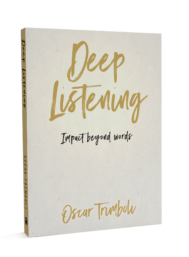One of the skills that differentiates a good facilitator from a great one is the ability to pay close attention to what’s not said. I’ve previously written about the importance of this discipline. You will often hear me ask a group, “How else could you have answered this question?” or “What do you notice about what responses have not [yet] appeared on this list?” It’s too easy to focus on what was actually said than on what could have been said. Both are instructive.

I’ve just finished reading Oscar Trimboli’s beautiful book called Deep Listening. He’s added a new dimension to my understanding of this concept of listening for the unsaid. He explains that we can only express 125 words in the time it takes our brain to process 400 words. For everything we say, there is more than double that much again that we would have liked to say in that same amount of time! So, while we may not have thought of certain answers to a question, it could be even more likely that we thought of them, but we need additional time to express them. Our mouth needs to catch up to our mind.My mom often jokes that her husband knows enough trivia to win at the game show Jeopardy! but he’d need to be given 5 minutes instead of 5 seconds to come up with each answer, as his knowledge takes time to percolate to the surface. Yet if I’m understanding Oscar’s book correctly, this communication gap goes beyond slow recall to encompass slow [but normal] expression of thoughts our brain has already conceived. Think of how much brilliance we miss hearing by moving on too quickly!
Perhaps this skill of deep listening — of recognizing that breaths and pauses are reflective of new content coming to life, not just a chance for us to jump in and fill the silence — is an example of wiser decisions coming faster through slowing down.

Do you have any tips on how to get the “unspoken” out in the room even though you know it is contentious and could cause an outbreak? I feel this is the biggest reason why we leave things unspoken in meetings.. not something I’d like to continue perpetrating but also want to keep meetings productive.
Generally I find candour and structure help. If there are topics that need to be discussed, better to discuss them than ignore them. If you know that in advance, plan time for those courageous conversations. Create a structure where input can be “anonymized” so ideas aren’t attached to individuals — for example, written on sticky notes on a wall. If you’re blindsided by the contentious issue, I’d suggest taking a quick breather to regroup if you can/need to, then asking either your sponsor/client or preferably the group as a whole whether they want to take time to discuss that issue now or schedule a time to discuss it later. If neither (!) then move on…